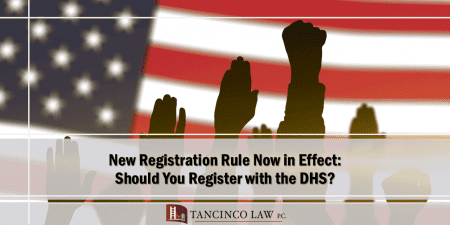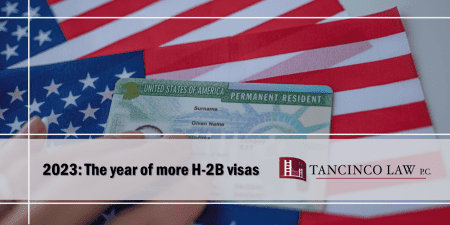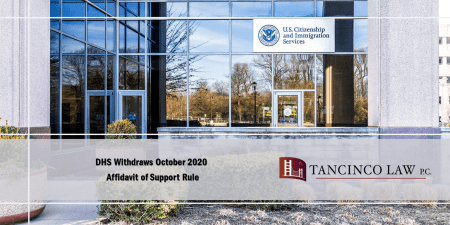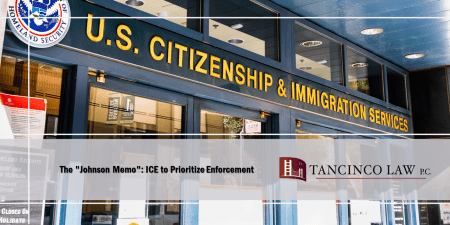A new federal rule requiring some non-U.S. citizens to register with the Department of Homeland Security (DHS) is now in effect as of April 11, 2025. This change may impact individuals who are in the United States without traditional immigration documentation—or who entered without a visa—and could carry serious consequences for those who don’t comply.

If you or someone you know is unsure about whether this rule applies to them, keep reading to understand who needs to register, what it involves, and the potential risks for both action and inaction.
Who Must Register Under the New Rule?
Registration is a process of notifying the government of your presence in the U.S. as a noncitizen. The requirement to “register” is in our immigration laws but has been rarely used. President Trump announced they will use this requirement for all noncitizens. The law requires all noncitizens over age 14 who remain in the U.S. for 30 days or more to register. (The law instructs parents to register those that are under age 14.) The law requires people to register before the 30-day period ends. The government posted a new form on the USCIS website for those that are not yet registered to use, Form G-325R.
The majority of immigrants and visa holders do NOT need to take additional steps under this new rule, as they are already considered “registered.” The following documents count as registration:
- A green card. If you are a permanent resident, you are registered
- A work permit, even if it is now expired. If you have an employment authorization card, for any reason, you are registered.
- An I-94. If you got an I-94 document, or received an I-94 electronically, when you entered the United States, you are registered. This includes entries with parole or a visa. If you got an I-94 when you got status, such as asylee, or U nonimmigrant, you are registered.
- An NTA. If you were issued a Notice to Appear in immigration court, you are registered. If you were issued an Order to Show cause (OSC) or a referral to the immigration judge, you are registered.
- A Border Crossing Card.
- A Landing Permit as a crewman.
- If you have applied for lawful permanent residence or temporary residence you are registered, even if that application was denied. (Forms I-485, I-687, I-691, I-698, I-700)
If you are already registered, you do not need to register now. Those who entered with visas are considered registered as they are provided with I-94s upon arrival or biometrics have already been taken at the time of the application for the non-immigrant or immigrant visa.
However, three key groups of individuals are covered by the new rule and must now register with DHS if they are in the U.S. for 30 days or more and are not otherwise registered:
- Canadian citizens who entered the U.S. by land for business or tourism, did not receive an I-94, and stayed 30 days or more.
- Foreign nationals who turn 14 years old while in the United States.
- Foreign nationals who entered the U.S. without inspection (for example, by crossing the border without being processed by immigration officials), and who remain in the U.S. for 30 days or more.
What Does Registration Involve?
If you’re required to register, here’s what you’ll need to do:
- Create a personal myUSCIS account
- Submit Form G-325R online, which collects biographic and immigration-related information
- Appear for fingerprinting and photos (biometrics), if you are age 14 or older and not a Canadian visitor
- Receive and carry a “Proof of Alien Registration” document at all times
For children under 14, a parent or guardian must complete the registration, but fingerprints are not required until the child turns 14.
Is There a Deadline to Register?
Yes—and it’s very important.
If you were already in the United States for 30 days or more on April 11, 2025, you were expected to register immediately. There is no 30-day grace period after that date.
For individuals who newly meet the 30-day requirement after April 11 (for example, new arrivals or children who recently turned 14), registration must be completed as soon as the 30-day mark is reached.
What Happens if I Don’t Register?
If you do apply for an immigration benefit with USCIS and have not registered, DHS could use a failure to register as a negative factor in deciding your case.
Failing to register or carry proof of registration can result in misdemeanor charges, including:
- Fines of up to $5,000
- Jail time (up to six months for failure to register, 30 days for failure to carry proof)
- Potential removal (deportation) if you are in violation of immigration laws
Also, if you move, you are required to report your new address to DHS within 10 days. Failing to do so may lead to detention or removal proceedings unless the delay was not willful or was reasonably excusable.
Important Note: Registration Can Carry Risks
The registration form asks for your address, information about you, your family, and immigration status, among other things. If you have no immigration status, immigration enforcement will know you are in the U.S. and the government says they will take steps to deport you. You may be detained.
For some people, registering with DHS may involve disclosing sensitive information—such as a criminal record or the fact that they entered the U.S. without inspection. These individuals may become visible to immigration enforcement through the registration process.
Before registering, those who are undocumented, have pending immigration cases, or have any criminal history should speak with an experienced and trusted immigration attorney. Legal advice can help you understand the risks and determine the best course of action.
What Should You Do Now?
If you think this new rule may apply to you or a family member:
➤ Determine if you are required to register
➤ Create a myUSCIS account and complete Form G-325R if needed
➤ Consult with an immigration attorney, especially if you have legal or immigration concerns
➤ Keep a copy of your registration proof with you at all times
For many, this rule will not affect them directly—but for others, it is critical to determine consequences of registering and not registering and their effect on their specific case. If you have questions or concerns about your situation, we’re here to help. Tancinco Law offers confidential consultations to guide you through the new DHS registration process and help you stay informed and protected.
~
If you would like to know how to set an appointment with Tancinco Law, click here.





